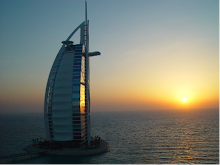One health condition that may never come to mind when "The United Arab Emirates" is brought up is diabetes. The U.A.E, however, has one of the world's highest rate of the metabolism disorder, second only to Nauru, a small Pacific island with a population of just 10,000. In fact, over 20% of the U.A.E's total population suffers from diabetes, with its neighbors, Saudi Arabia, Bahrain and Kuwait suffering rates of 16.7%, 15.2% and 14.4%, respectively.
This ailment, however, is just one unfortunate consequence of the past 3 decades of economic transformation. Before 1961, the capital of U.A.E, Abu Dhabi, had no more than a single paved road. Today, the region has enjoyed rapid growth in nearly every sector of the economy, and the culture. The pearling industry of the 60's and 70's gave way to the lucrative drilling for oil and natural gas; the demise of souks led to the expansion of the consumer culture and the opening of four of the world's largest shopping malls. This economic opulence has certainly brought on a sedentary lifestyle and diets high in sugar.
Could the demise of the simple, healthy life of the Middle East of the past have triggered this genetic disposition for one of the world's most dreaded diseases? Dysfunctional insulin levels are surely to blame for diabetes, and as newer, younger generations become more accustomed to these "Americanized" diets, it may very well be the case. Critics around the world continue to blame the Americanization of foreign cultures for the demise of traditional, beloved customs of century-old cultures around the world. It seems as if this fate has overtaken this region of the world. With small populations and inflated incomes per capita, this collection of nations is incredibly susceptible to the temptations of fast culture - one which plagues America and many other "Western" nations.
To combat record levels of diabetes, Abu Dhabi has allowed for construction of Imperial College London's immense diabetes center. With the disease now being used as a metaphor for the regions problems, it is very clear that something had to be done about it. Nearly 6,000 patients pass through the center on a daily basis. The chain of tests and procedures that the center operates may be among the largest in the world, and, after just 18 months of operation, has made tremendous breakthroughs in diabetes-focused medical science.
This is good news, and the hundreds of millions of dollars that the U.A.E government has vowed to inject into the research centers currently operating and in the planning process will surely help produce a revolutionary cure or two. But will it be in time? Can the unofficial cultural metaphor of the region hint at equivalent economic problems? Rapid inflation, the drying up of the world's richest oil sector and a growing workforce in desperate need of outside labor are all factors that may contribute to the reconsideration of many individuals, and corporations, as they look to over seas expansion potentials.
One or two thriving industries, namely tourism and education, should be able to carry and sustain a "healthy" economic lifestyle for the next few decades. Whether the rise of this ill-fated disease is a precursor to the demise of the culture, or even an omen, is anyone's guess.
If any Dubaian becomes worried about his or her health, they can simply enroll in one of the city's "Mall Walkers" classes. They will be able to work off those extra pounds in one of Dubai's mile-long mega malls, all while keeping their blood sugar levels to a reasonable level - for a meager cost of $100/session...
...Now if only America had this sort of motivation.
Thursday, May 15, 2008
Subscribe to:
Comments (Atom)


